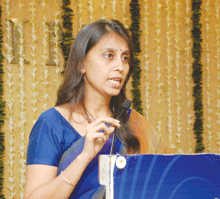Suddenly there is a refreshing awareness that well-educated and idealistic youth need to enter politics to clean up the rot within, and set new standards in public service
Shunned by the great Indian middle class as the last refuge of scoundrels, Indian politics is rock bottom on the career choice list of most citizens. The common perception is that this vocation is loaded with the baggage of corruption, criminalisation, nepotism and inefficiency. But of late, particularly in the aftermath of the 26/11 terrorist attack on Mumbai, there’s been a sea change in popular attitudes, with urban youth warming to the idea of politics as a career. Suddenly there is a refreshing awareness that well-educated and idealistic youth need to enter politics to clean up the rot within, and set new standards in public service.
Neither the Constitution of India nor the Representation of the People Act, 1951, mandate any formal education or other qualifications for citizens entering the electoral fray at the national, state or local government levels. But with the passage of time and complex demands of a contemporary political career, there’s no doubt that a graduate or postgraduate degree in political science, law, economics and/or management would be a great asset. In the new age of mass media, communication, management skills and a sound knowledge base are prerequisites of success. Therefore the great majority of latter-day politicians tend to have first degrees which could be supplemented with short-term diploma courses in rural, slum and human rights studies. Yet aspiring politicians should be aware that this is a roll-up-your-sleeves, get-in-the-mud vocation.
For non-dynastic entrants into politics, there are many entry points. One of the more important ones is through engagement with student politics at the collegiate and university levels. Another route is to enrol with the youth wing of an existing political party and work your way up from there. Aspirants could also branch off into politics after establishing themselves firmly in an allied or any other career e.g journalism, activism, law, social services and academia, which are good springboards for entry into politics.
With the winds of change blowing over India, newer options are also available, as parties such as the Professionals Party of India, which focus on the country’s growing urban middle class, have entered the political arena. “We decided that rather than being armchair politicians who carp about the system without even bothering to vote, it was time we acted. So we wrote the manifesto of a new political party. The Professionals Party of India (PPI) was constituted on September 7, 2007 and registered with the Election Commission in July 2008. Our slogan is ‘action for better governance’ and our objective is to improve the quality of life of every Indian,” says Dr. Hiru Bijlani, a director of several companies with 30 years’ management and consulting experience, who is the Mumbai convenor of PPI.
In the short span of six months, PPI has established a presence in several cities and thousands have joined its ranks. In the current general election the party has fielded two candidates from Mumbai, and hopes to field 100 in the next general election, scheduled for 2014.
“We are propagating our ideas, identifying candidates and raising funds. There’s reason to be optimistic about a career in politics. Over time more young people will step into the political fray and there’ll be lots of opportunities for them within our party,” says Bijlani.
 In the current general election, PPI has fielded Dr. Mona Patel Shah, an ophthalmic surgeon, as its candidate in the prestigious South Mumbai constituency against the incumbent MP, Milind Deora (Congress). “People are no longer prepared to tolerate the corruption, communalism, nepotism and inefficiency that have corroded our institutions of governance. Given this groundswell of anger, unless educated people take to politics, the nation is doomed,” says Shah.
In the current general election, PPI has fielded Dr. Mona Patel Shah, an ophthalmic surgeon, as its candidate in the prestigious South Mumbai constituency against the incumbent MP, Milind Deora (Congress). “People are no longer prepared to tolerate the corruption, communalism, nepotism and inefficiency that have corroded our institutions of governance. Given this groundswell of anger, unless educated people take to politics, the nation is doomed,” says Shah.
A well-known surgeon practicing in South Mumbai, Shah a graduate of the Grant Medical and Topiwala National Medical colleges, Mumbai, and is also a Fellow of the College of Physicians and Surgeons. Apart from her practice, she’s a consulting surgeon at three of the city’s ophthalmic hospitals and an honorary surgeon at the Municipal Eye Hospital at Kamathipura, Mumbai, where she heads a team of doctors who correct the sight of 300-400 under-privileged patients twice a week.
Dismayed about the painfully visible poverty, illiteracy and abysmal healthcare in India after 60 years of independence, Shah was driven to suspend her practice and plunge into politics via the PPI, with whose professionalism and values she identifies. As she aptly puts it, her aspiration is to move from correcting the sight of her patients to correcting the vision of India.
Well aware that the electoral odds are stacked against her, as she is a first-time candidate in a newly-formed political party, she remains unfazed. “It’s not a question of if I win, but when I win. I’m in politics for keeps. The country needs its youth to pull their weight,” says Shah.
Way to go, sister!
Indra Gidwani (Mumbai)